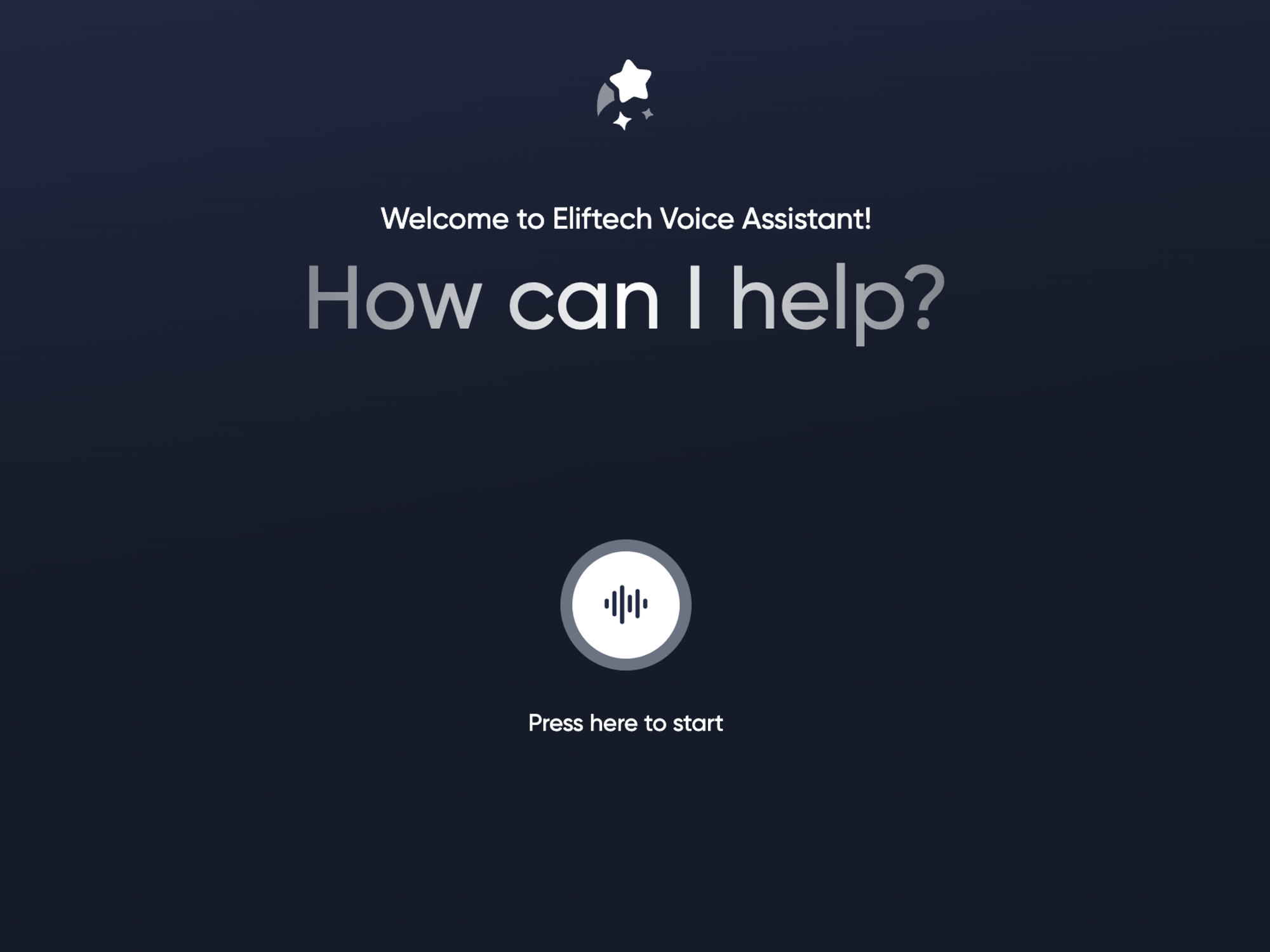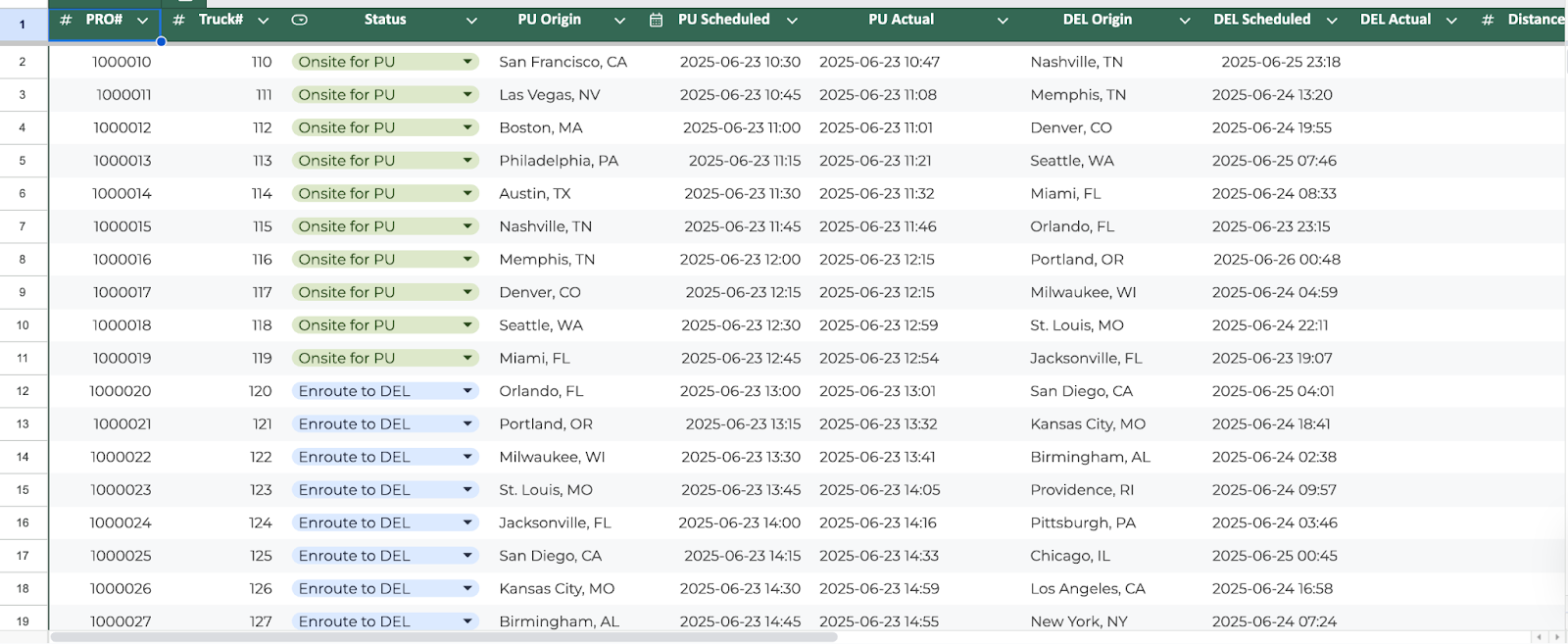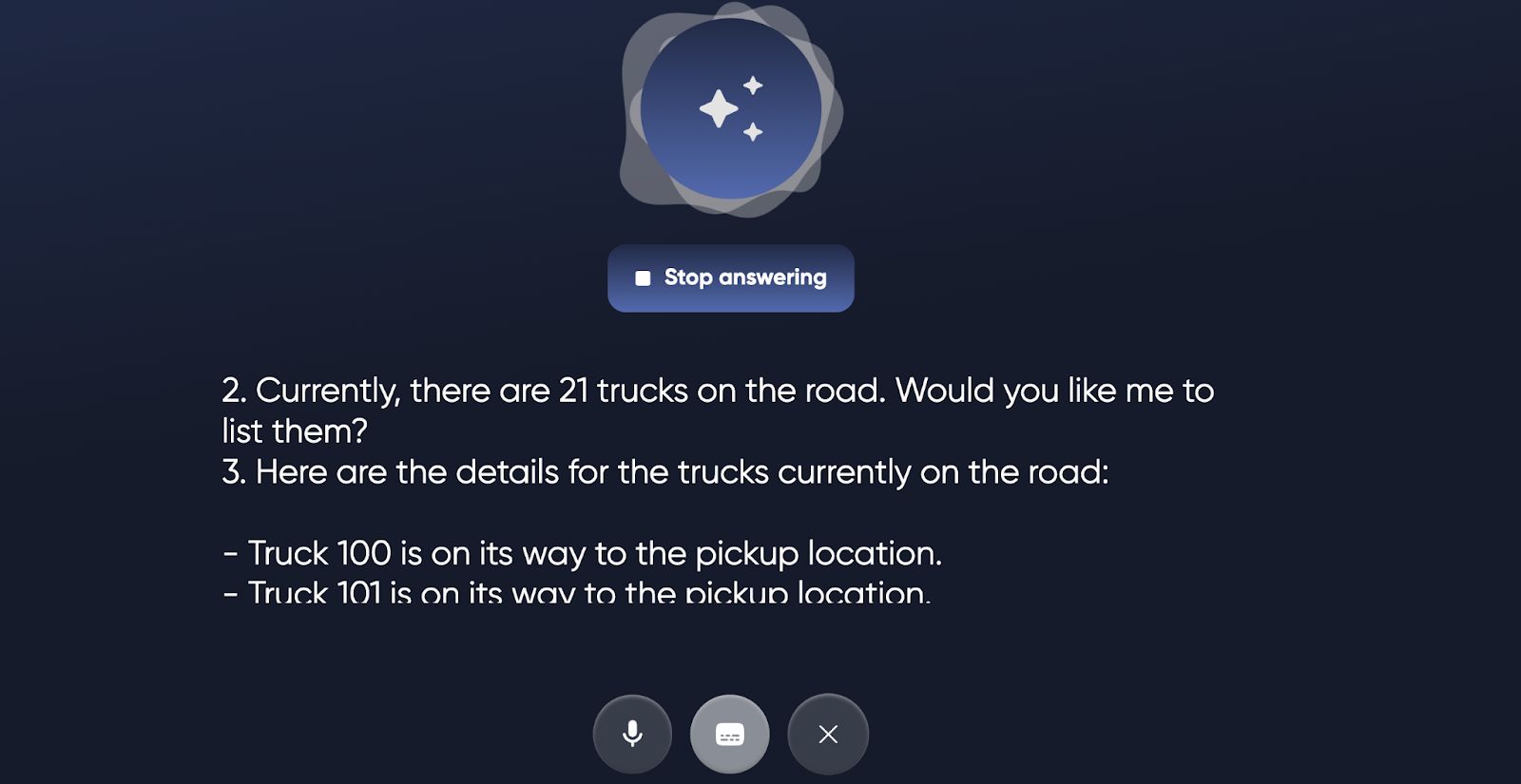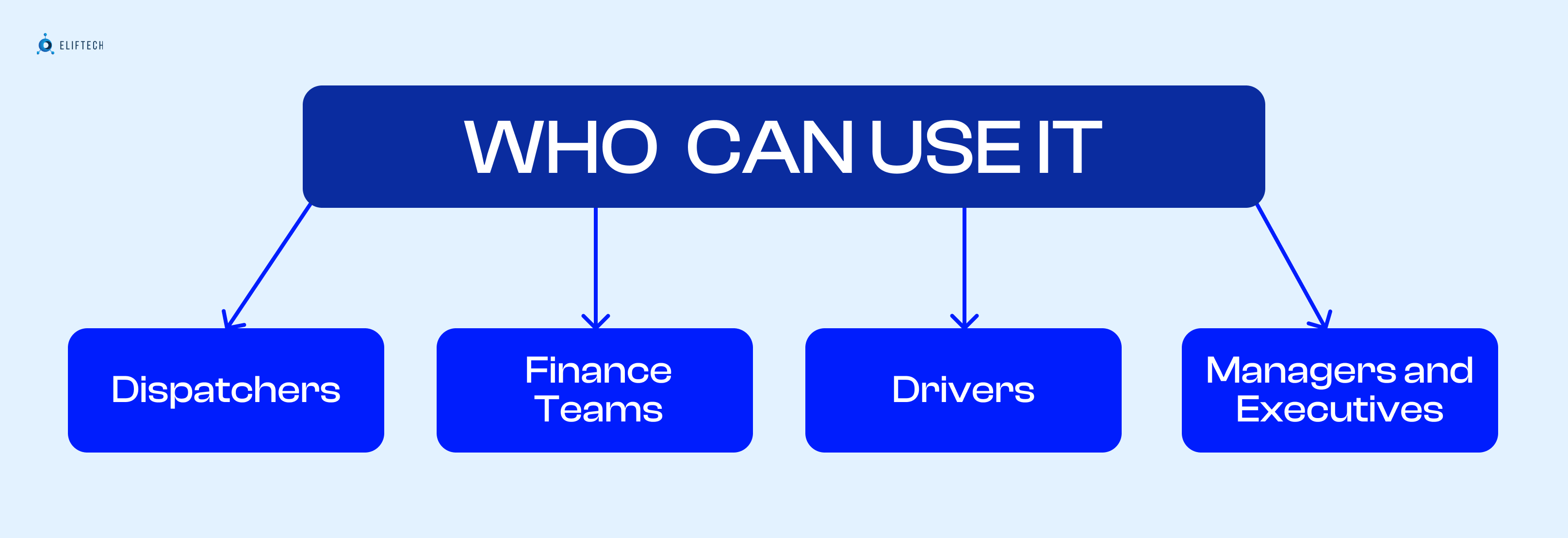Logistics
Maximize ROI with AI Voice Assistance

Introduction
Logistics operations are often complicated by inefficiencies: from repetitive data entry to countless status checks. The cost of this lost productivity is high. Time spent on repetitive tasks, such as manually updating schedules or searching for shipment information, can quietly erode tens of thousands of dollars in company profits each year. In fact, studies show that manual, routine tasks can cost around $16,000 per employee each year. For a team of dispatchers and drivers, that easily adds up to $100,000 or more in wasted work every year. This is time and money that could be saved by eliminating busywork.
ElifTech’s AI Voice Assistant is designed to tackle exactly these inefficiencies. This voice-activated assistant serves as a hands-free, intelligent helper for logistics teams, a solution to recapture those lost hours and reduce costly errors. It lets your team interact with systems by simple voice queries instead of clicks and keystrokes.
Core Capabilities
Our AI Voice Assistant has a range of powerful features specifically designed for logistics workflows. From instant answers about shipments and routes to seamless integration with your existing tools, it transforms the way your team gets information.
Instant Voice-Activated Queries
The Voice Assistant interface is waiting for a query. Users press the microphone button and ask a question (for example, "Which load has the best rate per mile?"), and the assistant quickly listens and processes the request. With instant voice queries, getting answers is as easy as asking a question out loud. A dispatcher or manager can press a button, speak a logistics-related question, and receive a reply in seconds, without typing or searching through menus.
For example, you could ask, "What’s the status of load 107?" or "How many shipments were delivered on time today?" and hear an immediate response. The assistant uses advanced natural language processing to understand the question and pulls the relevant data for you. This means no more digging through spreadsheets or TMS screens, just ask and you shall receive, instantly.


Fully Voice-Enabled Workflow Integration
Example of a dispatch board with live load and delivery data. Our Voice Assistant connects directly to such internal systems, allowing it to retrieve answers straight from your real-time logistics data. AI Voice Assistant is not a separate gadget; it connects to your existing logistics software and dashboards. Whether you use a dispatch board, a transportation management system (TMS), or an internal database, the assistant can securely connect and retrieve information on command.
This deep integration means the answers you get aren’t generic; they come directly from your company’s live data. For instance, if you’re looking at your dispatch board and need details on a shipment, you can simply ask, “When will Truck 112 arrive at its destination?” The assistant will cross-check the dispatch system and might respond, “Truck 112 is headed to Denver, CO with an expected delivery on August 24 at 08:33.” By voice-enabling your workflow, the assistant lets you stay in the flow of work; no need to switch screens or manually search records. In short, your entire logistics workflow becomes voice-accessible, making every query faster and more convenient.

Accessibility Built In
The assistant provides spoken answers and on-screen subtitles. In this example, it lists several results about the location of trucks and the traffic schedule, displaying each item as text and voicing it for the user. Each response from the voice assistant is delivered in a clear, human-like voice and accompanied by subtitles on the screen. This design is accessible and user-friendly.
In a noisy dispatch office or while multitasking, you might miss part of a spoken answer, but you can always read the on-screen transcript to catch up. The interface displays the assistant’s answers in writing, often in a neatly formatted list if there are multiple points. For example, if you ask for an overview of active loads, the assistant can respond verbally and simultaneously display a numbered list of loads with key details on the screen. These real-time captions make it easy for everyone to follow the conversation, including people who are hard of hearing or prefer to read.

Continuous Learning
The capabilities of our AI Voice Assistant only grow stronger with use. It employs continuous learning to adapt to your team’s needs and terminology over time. In practice, this means the assistant will become more familiar with your specific jargon, whether it’s abbreviations for warehouse locations or nicknames for drivers. Each interaction helps refine its language model and its connection to your data. For example, if your dispatchers often ask, “What’s the RPM on that load?” (meaning rate per mile), the assistant will learn this term and respond accurately with the rate per mile without needing clarification. The system can also learn from new data and patterns in your operations. If you start transporting a new type of cargo or implement new KPIs, the assistant can be updated to include this in its knowledge base. Over time, it becomes more sensitive to the information that is most important to you, offering faster responses and even proactive suggestions. This continuous improvement ensures that the voice assistant remains an asset that is constantly evolving, always relevant to your business, and becoming smarter with each passing day.
Why It Matters
The introduction of voice assistants in logistics has a real impact on the efficiency and accuracy of work. By eliminating routine tasks and optimizing communication, an AI-based voice assistant offers significant advantages:
Time savings for dispatchers
Instead of spending hours on low-value tasks (like sifting through load boards or making phone calls for updates), dispatchers can get what they need in seconds. This boosts their productivity and allows them to handle more loads or focus on exceptions and customer service. In fact, by automating routine queries, each dispatcher could save up to $3,200 worth of time per month that would otherwise be lost to busywork.
Greater driver efficiency and fewer errors
Drivers on the road often need quick info: addresses, appointment times, load instructions, but checking these traditionally meant stopping to call dispatch or fiddling with an app. With a voice assistant, drivers can safely ask for updates or confirm details hands-free, keeping their focus on driving. This leads to more on-time deliveries and less downtime waiting for answers. Moreover, because the assistant pulls answers straight from centralized data, it reduces the chance of human error. There’s less risk of a dispatcher misreading a load ID or a driver mishearing an address. Everyone works from the same accurate information.
For a single logistics team, restoring productivity hours and avoiding errors translates into real cost savings (as we have seen, potentially thousands of dollars per month per employee). When looking at the bigger picture, the impact on the industry is even more impressive; between 13% and 19% of logistics costs are lost due to inefficient interactions, representing up to $95 billion in annual losses in the US.
How You Can Use It
Our AI Voice Assistant is a versatile tool that various team members can use in their day-to-day work. Here are a few examples of how different roles in a logistics company can use it.

Dispatchers
Instantly check and update operational details without leaving their screen. For example, a dispatcher can ask “Which loads have the best rate per mile today?” and get an immediate answer. They can also request quick summaries like “Show me all deliveries scheduled for tomorrow” to plan ahead. This frees them from manual work and phone calls, allowing dispatchers to manage more loads and respond to issues faster.
Finance Teams
Finance professionals can retrieve key performance and financial data on command. They might ask: “What was our total fuel spend last week?” or “Which invoices are overdue?” The assistant pulls the data instantly, helping the finance team access insights and prepare reports without digging through spreadsheets. This means quicker decisions and better visibility into costs, revenues, and performance metrics.
Drivers
Today, an assistant can confirm whether a truck is at the loading site, en route, or in the process of working. This provides drivers and dispatchers with coordinated visibility without unnecessary back-and-forth calls. Although advanced features such as precise location data or voice-enabled status updates are not yet implemented, the system can be adapted to support them if required for your operations.
Managers and Executives
Beyond operational roles, managers and even CEOs can use the assistant to get a snapshot of how the business is performing without interrupting department heads or finance teams. Asking questions like “How many loads are scheduled today?” or “What’s our on-time delivery rate this week?” gives leadership direct access to real-time insights.
Also, for logistics leaders, the assistant can provide quick insights into fleet availability to support planning. A manager could ask: “Which trucks are currently free?” and instantly receive a list of available vehicles. Looking ahead, the system can also be customized to handle planning commands, such as: “Assign Truck 112 for loading on September 30, destination Scranton.”
These features highlight how an assistant can evolve from a simple information search tool to a comprehensive planning and decision-making tool, customized to each company's specific capacity and task management methods.
Looking Ahead
AI Voice Assistant by ElifTech is not a one-size-fits-all product, but a customized solution designed with your company's unique goals and workflows in mind. Every logistics operation works differently, so we develop an assistant that fits perfectly into your environment, whether it's dispatching, communicating with drivers, finance, or customer service.
We can adapt the system to your specific needs: integrate it with your TMS, WMS, or ERP systems, get real-time estimated arrival time data from mapping services, or connect to warehouse systems for instant inventory checks. We also plan to support multiple languages, making it easier for international and bilingual teams to use the assistant in their preferred language. As the AI learns your terminology and data over time, it becomes smarter every day and adapts more effectively to your processes.
Now is the time to discover what a personalized, AI-powered voice assistant can do for your team. ElifTech can customize it to meet your business goals, saving time, reducing errors, and increasing efficiency without adding complexity. Contact us for a demo, and let's create a solution that brings your goals to reality.
